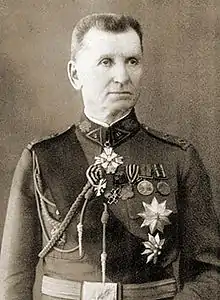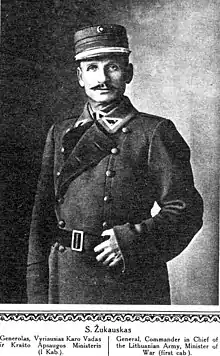Silvestras Žukauskas
Silvestras Žukauskas (Polish: Sylwester Żukowski, Russian: Сильвестр Константинович Жуковский, romanized: Silvester Konstantinovich Zhukovsky; 31 December 1860 – 26 November 1937) was a Lithuanian General first in the Imperial Russian Army, and later Lithuanian Army, after Lithuania regained its independence in 1918.
Silvestras Žukauskas | |
|---|---|
 General Slvestras Žukauskas in Lithuanian uniform | |
| Born | 31 December 1860 Poškiečiai-Dovainiškiai, Kovno Governorate, Russian Empire |
| Died | 26 November 1937 (aged 76) Kaunas, Lithuania |
| Allegiance | |
| Service/ | Imperial Russian Army Lithuanian Armed Forces |
| Years of service | 1881–1928 |
| Rank | General |
| Battles/wars | Russo-Japanese War First World War Lithuanian–Soviet War Polish–Lithuanian War |
| Awards | Great Cross of the Order of the Cross of Vytis (1919) |
Education
After graduating from the secondary school in Marijampolė, Žukauskas studied at the Vilnius military school in Vilnius.
Service in the Imperial Russian Army
In 1881, he enlisted in a cavalry unit of the Russian Empire. In 1898, he married and converted to Lutheranism because this helped him pursuing his career. Žukauskas participated in the Russo-Japanese War, advancing through the ranks. In 1912 he was promoted to the rank of Colonel. He held a command in World War I, and was awarded the golden sabre for the defense of Šiauliai.[1] In 1916 he attained the rank of Major-General.
Lithuanian Wars of Independence
Upon Lithuania regaining its independence in 1918, Žukauskas returned home to Lithuania and began creating and organizing the Lithuanian Armed Forces. Between April 26, 1919 and May 27, 1919 Žukauskas served as the Chief of General Staff.[2] During that time he also organized a defense against the Bolsheviks. On May 7, 1919 he was appointed the Supreme Commander of the Lithuanian Army (serving until September 24), at the time also acting as Chief of the General Staff. Under Žukauskas' direct command the Kurkliai–Panevėžys operation was planned. During its implementation, Ukmergė and Panevėžys were liberated from Bolshevik control. After this operation Žukauskas established the military Order Už tėvynę (For the Homeland), later renamed the Vytis cross on February 3, 1920 and the Order of the Cross of Vytis on September 1, 1930. At first, it was awarded as a ribbon, without a medal.
On May 26 – June 6, 1919 the Lithuanian offensive continued during the planned Kupiškis–Utena operation, and the towns of Biržai, Nemunėlio Radviliškis, Utena were liberated. The Red Army retreated from Kupiškis in order to avoid encirclement. The offensive continued as Obeliai was captured. The Lithuanian Army halted when it reached the Daugava River, and then joined the Lithuanian Army's main forces and took on the Bermontians who were invading northern Lithuania.

Coup attempt of August 1919
On 26 September 1919 Žukauskas was dismissed from the position of Supreme Commander, because of his possible involvement in the Polish attempt of August 1919 to establish pro-Polish government in Lithuania with Žukauskas as a dictator. He most likely wasn't aware of the plot, but undoubtedly had strong connections to Poland. In February 1919 published in the newspaper Suvienytoji Lietuva article advocating for a union between both countries.[3] In early August he had a meeting in Kaunas with major Tadeusz Kasprzycki, an envoy of Marshal Piłsudski to Lithuania, during which he supposedly said that he considers himself Polish and that he took the lead of Lithuanian Army only to bring about an agreement with Poland.[4] During the action of Lithuanian intelligence against Polish Military Organisation in Kaunas on the night of 28–29 August he was almost arrested by Liudas Gira, but saved only by the personal intervention of the President Smetona; Gira supposedly called him then "Polish adherent who cannot be trusted".[3] Nonetheless both his aide-de-camps general Witold Dołęga-Otocki (Vytautas Otockis, later colonel in the Polish Army) and Leonardas Vojtekūnas were arrested.[3] Žukauskas helped them to get released during their trials.
1920
General Žukauskas took an active part in suppressing the rebellion of revolutionised soldiers of Kaunas regiment 21–23 February 1920.[5] On February 23, he was once again named Supreme Commander of the Lithuanian Army, in place of Pranas Liatukas, who was arrested by rebels. He stayed in this position until June 14, 1920, when he was forced to step down due to the resistance of many younger officers. Among them, Kazys Ladiga, Ignas Musteikis, Julius Čaplikas, Adolfas Birontas, Jonas Petruitis and Vytautas Steponaitis, which were all against a "Polish" general leading Lithuanian Army.[6] The ethnic tension was decisive, Žukauskas during his meeting with Eugeniusz Romer on 12 March 1920, having said that the quality of Lithuanian Army decreased after the dismissal of Polish officers and their replacement with inexperienced Lithuanian officers.[7] Jonas Galvydis-Bykauskas took his position as Supreme Commander.
Žukauskas to this point was generally regarded as an advocate of close relations with Poland, possibly even a union. He probably reevaluated his opinion in July 1920 when he went to Vilnius in an attempt to organise Polish resistance against approaching Bolsheviks in the city. He supposedly was trying to take over the command of the city's defence, which led to disagreements with Polish officers already in a place. He went back to Kaunas on 12 July, two days before the fall of the city, and the day of the signing of the peace treaty between Lithuania and Soviet Russia.[8]
When the war with Poland erupted on October 8, 1920, he again became Supreme Commander of the Lithuanian Army until the end of hostilities. He resigned on May 29, 1921.
Interwar
Following the end of hostilities Žukauskas returned to civilian life and began working as a nominal executive of the American-Lithuanian Company. This enterprise initiated a power plant near Šiauliai, began a bus transportation line, and built gas stations and maintenance garages.
.jpg.webp)
Upon being recalled into military service, Žukauskas served once again as the Supreme Commander of the Lithuanian Army between June 5, 1923 and January 25, 1928. In 1923 there was a letter of protest circulating among Lithuanian military, issued by nationalist officers, in which they criticized the appointment of Žukauskas:
"We duly appreciate and respect him and his talent as a commander in war, but we cannot forgive his origins, which we must always bear in mind".[9]
He was noted by French diplomats as being a Francophile.[10]
Silvestras Žukauskas died in 1937 and is buried in Kaunas' Lutheran cemetery.
Awards
- 1919 Great cross of the Order of the Cross of Vytis
- Order of Lāčplēsis, 2nd class.[11]
Family and marriage
At the age of 38, in 1898, he married the German Josephine Hasdorf.
References
- "Knygos "Generolas Silvestras Žukauskas" pristatymas". Krašto apsaugos ministerija (in Lithuanian). Retrieved 2008-05-24.
- "Lietuvos Respublikos Krašto Apsaugos Ministerija". Retrieved 2008-05-23.
- Kilinskas 2017, p. 87.
- Łossowski 1996, p. 61.
- Łossowski 1996, p. 99-100.
- Kilinskas 2017, p. 88.
- Łossowski 1996, p. 100.
- Tomasz Paluszyński, Zaburzenia kowieńskie w lutym 1920 roku w świetle dokumentów dyplomacji polskiej, "Przegląd Zachodni", no. 1 (1994), p. 106-107.
- Kilinskas 2017, p. 90-91.
- Jokubauskas, Vytautas (2014). "KARINĖ DOKTRINA: TARPUKARIO LIETUVOS KARIUOMENĖS ATVEJIS (1923–1940 M.)". Karo Archyvas (in Lithuanian). Vilnius: GENEROLO JONO ŽEMAIČIO LIETUVOS KARO AKADEMIJA. XXIX: 144. ISSN 1392-6489.
- Priedītis, Ērichs Ēriks (1996). Latvijas Valsts apbalvojumi un Lāčplēši (in Latvian). Riga: Junda. ISBN 9984-01-020-1. OCLC 38884671.
Sources
- Aničas, Jonas (2006). Generolas Silvestras Žukauskas (1861–1937) (in Lithuanian). Vilnius: Lietuvos Respublikos krašto apsaugos ministerija. p. 293. ISBN 9986-738-76-8.
- Kilinskas, Kęstutis (2017). ""Lithuanian nationalists" against "Imperial Russians"?. Generational conflicts between senior Lithuanian army officers" (PDF). Acta historica universitatis Klaipedensis. 34: 81–99.
- Łossowski, Piotr (1996). Konflikt polsko-litewski 1918-1920 (in Polish). Warszawa.